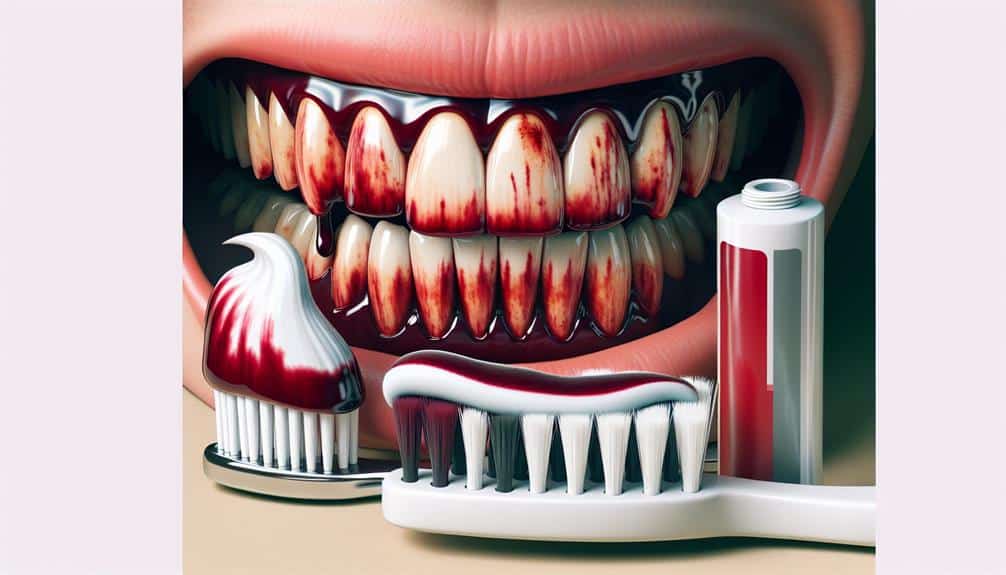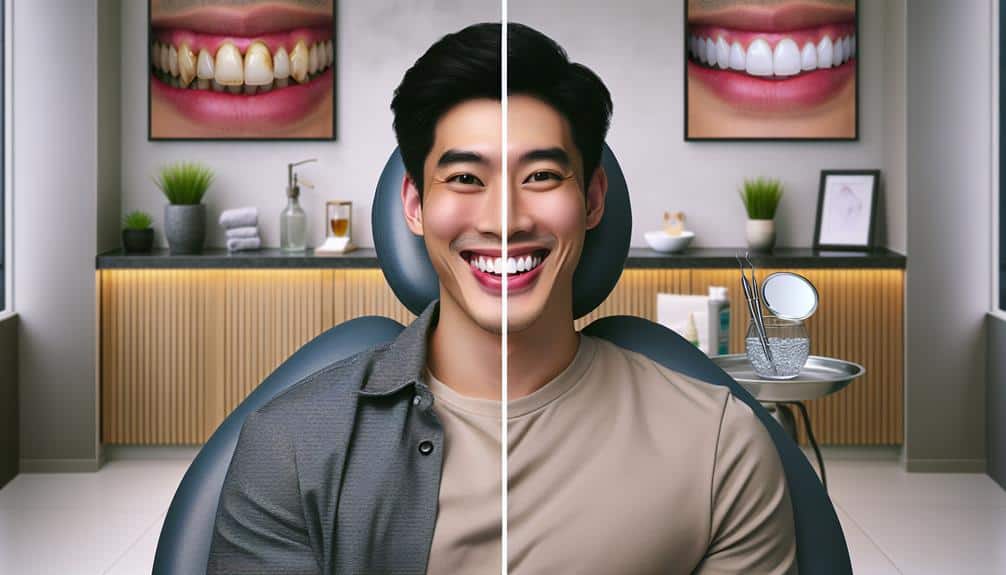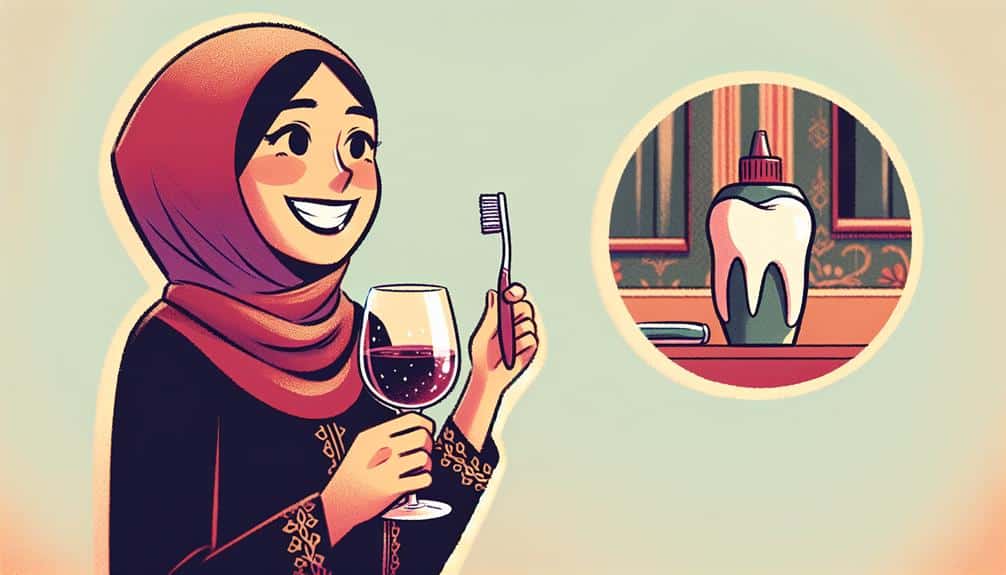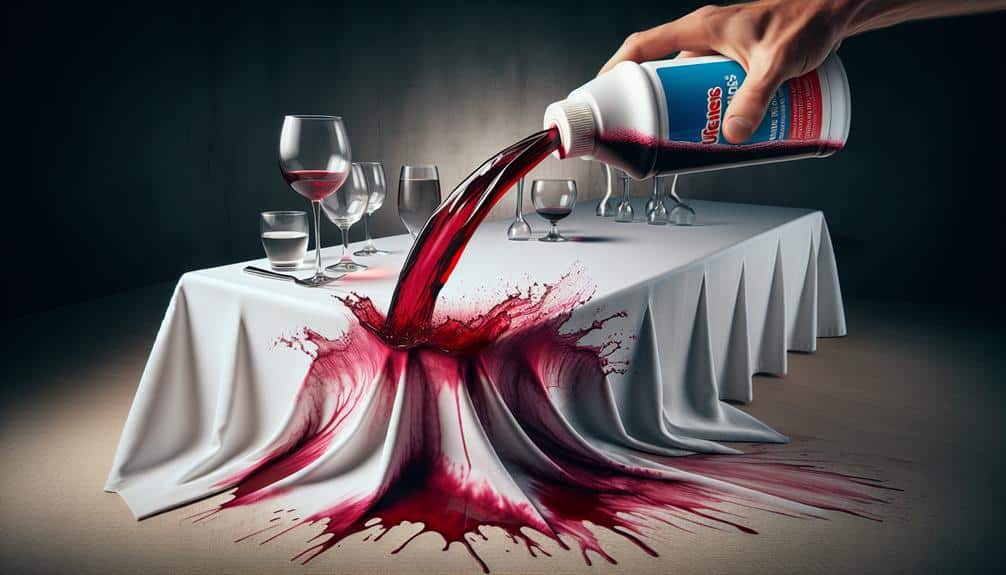Remove wine stains on your teeth by trying these proven methods: opt for professional whitening treatments, explore DIY remedies like baking soda or hydrogen peroxide, and consider lifestyle changes such as oil pulling and avoiding teeth-staining foods. These methods offer effective ways to combat wine stains and enhance your smile.
Key Points
- Professional whitening treatments offer long-lasting results with advanced technologies.
- DIY remedies like baking soda and hydrogen peroxide can help reduce wine stains.
- Maintaining good dental hygiene and using mouthwash can prevent and combat stains.
- Drinking water while consuming wine and using a straw can minimize staining.
- Lifestyle changes like oil pulling and eating crunchy foods promote whiter teeth.
Types of Wine Stains on Teeth
When wine stains your teeth, they can manifest in various shades and intensities, depending on the type of wine consumed. Red wines like Cabernet Sauvignon or Merlot contain chromogens, tannins, and acids that contribute to the deep staining effect on teeth. These compounds have the potential to adhere to the enamel, causing the teeth to turn a dark red or purple hue. White wines, on the other hand, are more acidic and can lead to enamel erosion, making the teeth more susceptible to staining from other food and drinks.
The causes of wine stains on teeth are primarily attributed to the pigmented compounds found in the wine, which have a strong affinity for enamel. The effects of these stains can range from mild discoloration to more severe, noticeable dark spots on the teeth. Treatment options for wine stains include professional dental cleanings, at-home whitening kits, and cosmetic procedures like veneers or bonding. Prevention strategies involve drinking water alongside wine to reduce its contact with teeth, using straws to minimize direct exposure, and maintaining good oral hygiene practices.
Preventing Wine Stains on Teeth
To prevent wine stains on your teeth, incorporate these proactive measures into your routine. Start by maintaining excellent dental hygiene. Brush your teeth at least twice a day with a whitening toothpaste containing ingredients like hydrogen peroxide or baking soda, which can help prevent discoloration. Flossing daily is also important to remove any plaque or food particles that can contribute to staining. Additionally, consider using a mouthwash that targets stains and strengthens enamel.
Another way to prevent wine stains is to drink water while consuming wine. Swishing water around in your mouth after each glass of wine can help wash away the pigments before they settle on your teeth. You can also use a straw when drinking wine to minimize its contact with your teeth. Furthermore, eating cheese or crunchy fruits and vegetables like apples and carrots while enjoying wine can help scrub away surface stains.
DIY Remedies for Wine Stains
Explore simple and effective DIY remedies that can help combat wine stains on your teeth and restore your smile's brightness. When dealing with wine stains, natural solutions and home remedies can be a good starting point before seeking professional help.
One popular method is using baking soda, which acts as a mild abrasive to gently scrub away surface stains. Create a paste by mixing baking soda with a small amount of water and brush your teeth with it for a couple of minutes.
Another option is to apply a mixture of hydrogen peroxide and water to your teeth using a cotton swab. Hydrogen peroxide has whitening properties that can help reduce the appearance of stains.
Additionally, rubbing the inside of a fresh orange peel on your teeth is a natural way to combat discoloration. These DIY remedies offer affordable and accessible ways to address wine stains, but remember to consult a dentist for professional advice if needed.
Professional Whitening Treatments
Consider professional whitening treatments as a viable option to effectively remove stubborn wine stains on your teeth and enhance your smile's brightness. Professional whitening treatments are performed by dental professionals and offer cost-effective options for those seeking rapid results. These treatments use advanced whitening agents and technologies that can noticeably lighten stains caused by wine consumption. Unlike over-the-counter products, professional whitening treatments are tailored to your specific needs, ensuring a personalized approach to achieve the desired level of whitening.
One of the key advantages of professional whitening treatments is the expertise of dental professionals who oversee the procedure, ensuring safety and effectiveness. Additionally, these treatments often provide more dramatic and longer-lasting results compared to DIY remedies. By opting for professional whitening, you can enjoy a brighter smile in a shorter amount of time, making it a convenient choice for individuals looking to quickly address wine stains on their teeth.
Lifestyle Changes for Whiter Teeth
Making simple adjustments to your daily habits can contribute to achieving whiter teeth naturally. Natural remedies and dietary changes play a significant role in improving the color of your teeth.
One effective natural remedy is oil pulling, where you swish coconut or sesame oil in your mouth for about 15-20 minutes to reduce bacteria and plaque buildup. Additionally, baking soda mixed with water to form a paste can act as a gentle abrasive to help remove surface stains on your teeth.
Dietary changes can also positively impact the whiteness of your teeth. Avoiding foods and drinks that stain, such as coffee, tea, and red wine, can prevent discoloration. Instead, consume crunchy fruits and vegetables like apples, carrots, and celery, which can help scrub your teeth naturally while you chew. Drinking plenty of water throughout the day can also help wash away food particles and reduce the risk of staining.
Frequently Asked Questions
Can Wine Stains on Teeth Lead to Other Dental Health Problems?
Wine stains on teeth can lead to other dental health problems. The severity of staining depends on wine consumption. Over time, these stains may cause enamel erosion. Maintaining good oral hygiene can help prevent these issues.
Is It Possible to Remove Old or Stubborn Wine Stains on Teeth?
To remove old or stubborn wine stains on teeth, you can explore home remedies like baking soda and hydrogen peroxide. For tougher stains, consider professional dental procedures such as teeth whitening treatments to effectively eliminate discoloration and restore your smile.
Are There Any Natural Ingredients That Can Help Prevent Wine Stains on Teeth?
To prevent wine stains on teeth, consider natural remedies like using baking soda or activated charcoal. These preventive measures can help maintain a brighter smile. Make them a part of your dental routine for best results.
How Long Does It Typically Take for Professional Whitening Treatments to Show Results on Wine-Stained Teeth?
For professional whitening treatments to show results on wine-stained teeth, it typically takes a few sessions over a few weeks. Professional treatments are more effective and quicker than at-home options, providing noticeable improvements in whitening effectiveness within a shorter time frame.
Can Certain Medications or Health Conditions Make Wine Stains on Teeth More Difficult to Remove?
Certain medications or health conditions may contribute to stubborn stains on your teeth, making removal more challenging. While professional treatments can help, exploring natural remedies like baking soda or activated charcoal might offer gentle alternatives worth considering.



